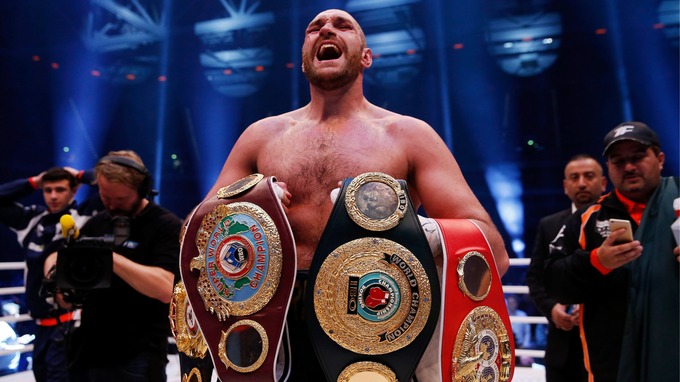Boxing’s Affinity for the Alphabet: Brief History of Each Championship Belt

By Eddie Sanchez
Manny “Pacman” Pacquiao is often referred to as “The People’s Champ.” Although this may be somewhat confusing, no, this is not a legitimate title within the industry. This is a nickname awarded to him from his loyal fanbase.
No one can blame you for the confusion though, because it seems like there are 100 champions in 1,000 different weight classes. The truth of the matter is, there are seventeen weight classes ranging from Minimumweight at 105 pounds, all the way up to Heavyweight which has a 200 pound minimum.
Within these classes there are four recognized Major World Champion sanctioning bodies:
WBA – World Boxing Association (est. 1962)
WBC – World Boxing Council (est. 1963)
IBF – International Boxing Federation (est. 1983)
WBO – World Boxing Organization (est. 1988)
This is where most of the confusion lies for the casual fan. With seventeen different weight classes and four sanctioning bodies, up to 68 different individuals can be recognized as a major champion.
To offer some context for how this came to be, let’s take a look at each of these:
WBA
The WBA is the oldest of the four current major recognized sanctioning bodies. This organization, while being the oldest, has had charges of corruption and claims of illegitimacy that have clouded their reputation. There have been multiple claims of promoters paying bribes to the WBA to have their fighters ranked in the 80s, which led to other organizations gaining prominence.
This organization also ranked a dead person! Ali Raymi was 25-0 in 2015 and although he faced inferior competition, was ranked number 6 by the WBA in the Light Flyweight division. Ali was then killed in an ISIS airstrike in Yeman which lead the WBA to move him down to 11. This instance, while likely an error, was not the best look for the organization.
Further compounding their negative public perception is the fact that the WBA implements Interim, Regular and Super champion statuses. These create much confusion, even for the most educated fans and further adds towards the alphabet city.
WBC
The WBC, which came a year after the WBA, has been fortunate to be regarded as the most prestigious belt within the boxing industry. The organization has had their belt depicted in many films and has had some boxing’s most prominent championship fights. The Legends that have held the WBC belt include: Muhammad Ali, Joe Frazier, Sugar Ray Leonard, Floyd Mayweather, Joe Calzaghe, Canelo Alvarez and most recently the best modern heavyweight rivalry between Wilder and Fury.
While the positive public perception has been great, the WBC has had their share of controversies to say the least. In the current climate, the WBC has been accused of favoring star fighters and offering preferential treatment. Three of the best examples would be the sanctioning body not following through with forcing mandatory fights on to Mayweather, Canelo or Wilder.
Even worse however, the WBC gained a reputation for being in Don King’s pockets and not honoring mandatory status for fighters. Mike Tyson was issues mandatory status after his stint in prison, Leon Spinks was stripped of his title so two of Don King’s fighter could fight for the title and Hector Camacho being listed as mandatory after Don King’s complaint. You get the picture. There have been many cases documented where the WBC has been corrupt.
The corruption has been toned down a bit since Jose Sulieman (the WBC official) died and his son took over, but there is much history, both good and bad, within this organization.
IBF
The IBF (1983) was preceded by the United States Boxing Association and has run as a clean-cut sanctioning body ever since.
As if this is remotely true. The IBF just might be the most corrupt of these bodies, which would be saying a lot. Robert Lee, the head of the IBF at the time, was notorious for taking bribes in the 80s in exchange for positive rankings. The corruption escalated to a point where Bob Arum (Head of Top Rank) testified that he paid $100,000 to have Axel Schultz as George Foreman’s opponent. Lee was eventually convicted after video evidence showed him accepting a $5,000 bribe. Robert, his son and others were prosecuted for bribery and racketeering.
After the shenanigans, the IBF went through three leadership changes and has since been the strictest with holding mandatory status accountable.
WBO
The WBO sanctioning body came to be after members of the WBA defected after the 1988 annual convention. The has lead to their organization carrying a “less than” cloud over their heads as a reputation, but there have been some respectable fighters to hold the WBO belt such as Manny Pacquiao.
Their negative reputation impacted a number of fighters in the nineties and two-thousands however. The WBC, on numerous occasions refused to consider the WBO a legitimate belt which lead to some fighters missing out on unification opportunities. Extending into the more recent era, Floyd Mayweather and Al Haymon (his advisor) has discontinued their legitimacy a number of times which is not the type of persona you want against you given his standing within the industry.
As you are likely able to conclude, politics between promoters and sanctioning bodies cause much confusion and halt many opportunities for specific individuals. This has negatively affected the product for some time and has created a standing where four different individuals can claim to be the baddest man in any division at one time, with the potential that each fighter might never face each other.
Perhaps the industry just has an affinity for the alphabet, but more likely there are too many cooks in the kitchen that have a powerful enough position to maneuver in contradicting directions.
What are your thoughts on having four sanctioning bodies that can each claim to have the champion of the world for a division? Does this help or hurt the sport?